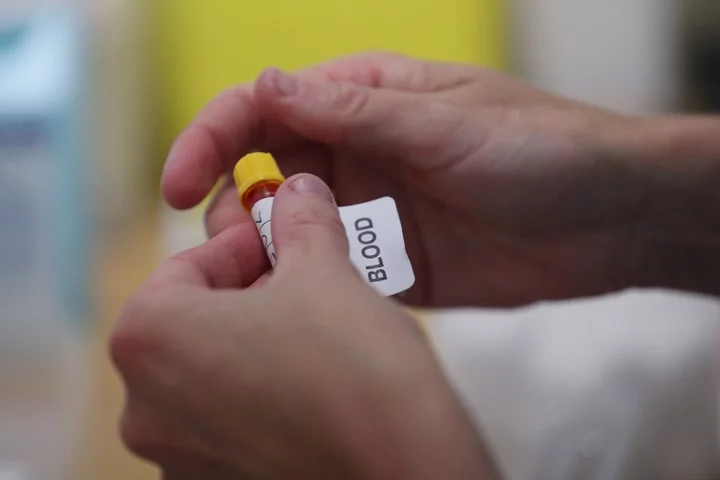
Meituan Buys Co-Founder’s Months-Old AI Startup for $234 Million
Meituan is buying a co-founder’s generative AI startup for almost $234 million, a deal that gets the food-delivery
2023-06-29 18:48

Virgin Galactic rocket plane poised for first commercial flight to edge of space
By Jose Luis Gonzalez and Steve Gorman TRUTH OR CONSEQUENCES, New Mexico A twin-fuselage jet stood ready on
2023-06-29 16:26

EssilorLuxottica Adds Jimmy Choo to Its Deep License Portfolio
EssilorLuxottica SA, the world’s biggest eyeglass maker, will produce Jimmy Choo Eyewear under a 10-year licensing deal starting
2023-06-29 16:23

Heart disease digital check-ups for over 40s being rolled out
People over 40 in England will be sent a blood test to carry out at home in a bid to reduce heart disease and obesity. Digital NHS health checks, which will also include an online health questionnaire, will be launched next spring for people aged 40 to 74. Around 15 million people will be eligible, with around one million online checks expected to be carried out over the next four years. Health and Social Care Secretary Steve Barclay said: “Thousands of heart attacks and strokes could be prevented every year through simple health checks, which could save lives and ease pressure on the NHS. “This new digital check-up will mean people can do simple tests and get tailored advice from homes while reducing pressure on GP services.” The home blood test will check cholesterol levels with patients asked to take a blood pressure test at a pharmacy, alongside the online assessment covering details such as weight, height, diet, alcohol intake and exercise levels. Results will be made available online with help available to anyone showing early signs of issues such as diabetes or heart disease, as well as referrals to weight-loss clinics or medication. The online questionnaire will be available via phone, tablet or computer and the Government believes each check will save 20 minutes of NHS time. This could play an important role in helping people live healthier for longer and saving lives in the coming years, while reducing pressure on the NHS Professor Sir Nilesh Silemani Cardiovascular disease is the second biggest killer in England, affecting around 6.4 million people. The Government says the new digital check will help to identify 200,000 people who could benefit from the use of statins, 30,000 cases of hypertension and prevent around 400 heart attacks and strokes over the first four years. Professor Sir Nilesh Samani, medical director at the British Heart Foundation, said: “This initiative will help to reach more people and encourage them to get their blood pressure and cholesterol levels checked so that, where necessary, healthcare professionals can work with them to manage their condition. “This could play an important role in helping people live healthier for longer and saving lives in the coming years, while reducing pressure on the NHS.” Existing NHS health checks for people in the same age group take place face-to-face with a GP and concerns have been expressed that elderly people are not left behind if they struggle with technology. David Baines, vice chair of the Local Government Association, told The Times: “Making more digital health checks available is a useful tool to detect certain illnesses but it should be treated as an addition to, not a replacement for, a physical health check.”
2023-06-29 16:15

Ipsen Gets FDA Advisers’ Backing for Rare Bone Disease Drug
Ipsen SA’s drug for a rare bone disease got support from a panel of US drug regulatory advisers,
2023-06-29 15:21

Exclusive-WHO's cancer research agency to say aspartame sweetener a possible carcinogen-sources
By Jennifer Rigby and Richa Naidu LONDON One of the world's most common artificial sweeteners is set to
2023-06-29 14:18

Dementia diagnosis could be sped up thanks to AI
A new artificial intelligence (AI) tool may be able to look for early signs of dementia and Alzheimer’s disease, speeding up diagnosis. The technology, which could help doctors assess the early signs of the condition more efficiently, has been developed by researchers at the University of Sheffield. Known as CognoSpeak, the system uses a virtual character displayed on a screen to engage a patient in a conversation. It asks questions to test memory, inspired by those used in outpatient consultations and conducts cognitive tests, such as picture descriptions and verbal fluency tests. This tool could help patients start treatments sooner, reduce waiting times and give people certainty earlier Dr Dan Blackburn, University of Sheffield After that, the tool uses AI and speech technology to analyse language and speech patterns to look for signs of dementia, Alzheimer’s disease and other memory disorders. Researchers behind the technology suggest it could play a key role in reducing the burden on dementia assessment services, once further testing in GP and memory clinics across the UK is complete. The National Audit of Memory Assessment Services in England and Wales, conducted between January and August 2021 by the Royal College of Psychiatrists and supported by Alzheimer’s Society, found that the average waiting time from referral to dementia diagnosis had increased to 17.7 weeks. This was up from 13 weeks in 2019, with waiting times across services nationwide ranging between zero and 104 weeks (two years), compared to three and 34 in 2019. There are currently around 900,000 people in the UK living with dementia, and this is projected to almost double by 2040, according to the Alzheimer’s Society. Dr Dan Blackburn, from the University of Sheffield’s Department of Neuroscience, said: “Waiting for a possible diagnosis of dementia can be a very anxious time for patients and their families. “This tool could help patients start treatments sooner, reduce waiting times and give people certainty earlier. “The CognoSpeak system could transform how dementia and other memory disorders are diagnosed by speeding up assessments. “This would also free up clinicians’ valuable time and mean that those who need specialist care get access to it as quickly as possible.” Also an Honorary Consultant Neurologist at Sheffield Teaching Hospitals NHS Foundation Trust and researcher at NIHR Sheffield BRC, he added: “There is a real clinical need for this kind of technology. “There are long waiting lists for memory clinics across the UK, but there are also inequalities in accessing the memory clinics service. “The CognoSpeak tool can reduce these inequalities and help make the service more efficient.” The CognoSpeak system could transform how dementia and other memory disorders are diagnosed by speeding up assessments Dr Dan Blackburn Professor Heidi Christensen, from the University of Sheffield’s Department of Computer Science, added: “The way a person speaks can tell us a great deal about their cognitive health and emotional wellbeing, and give us a very early indication of any signs of cognitive decline that may not otherwise have been detected. “The system we’ve developed here at Sheffield uses speech technology to automatically extract these signs and the automation means we can provide a consistent, accurate and fast assessment for everyone. “CognoSpeak is advanced, high tech and based on world-leading research in this field. “We have the biggest collection of data for this type of assessment anywhere in the world, which we’re using to advance the technology and improve its accuracy.” The system is being designed in a way that means once it is fully rolled out, a GP could refer a person with memory complaints to use the technology. CognoSpeak would send the test results back to the GP and then they would decide whether to refer the patient to a memory clinic for further assessment. The programme can be accessed through a web browser – meaning patients are able to take the test in the comfort of their home, rather than having to wait for a hospital appointment to take a pen-and-paper-based assessment. Researchers say early trials have shown the technology is as accurate at predicting Alzheimer’s as the current written tests used to assess or screen for cognitive, memory or thinking impairments. According to the team, previous research has demonstrated accuracies of 90% for distinguishing people with Alzheimer’s from people that are cognitively healthy. Developed by Dr Blackburn and Prof Christensen, the system is still in the research phase, but a £1.4 million National Institute for Health and Care Research (NIHR) grant will allow it to be trialled more widely. The researchers are recruiting 700 participants from memory clinics across the UK to help develop the system further. The tool has been developed in collaboration with Therapy Box – a company specialising in speech and language technology – and the National Institute for Health and Care Research (NIHR) Devices for Dignity MedTech Cooperative (D4D). Read More Charity boss speaks out over ‘traumatic’ encounter with royal aide Ukraine war’s heaviest fight rages in east - follow live Reading for pleasure in childhood boosts brain health in teenage years – study Stan Wawrinka on setbacks, preparing for Wimbledon and friendship with Roger Federer Hacks for saving money on school uniforms
2023-06-29 13:51

China on Track to Blow Past Xi’s Clean Power Goal Five Years Early
China is on track to almost double its wind and solar capacity by 2025 and blow past the
2023-06-29 11:49

Scientists discover that universe is awash in gravitational waves
By Will Dunham WASHINGTON Scientists on Wednesday unveiled evidence that gravitational waves, the ripples in the fabric of
2023-06-29 10:58

World faces 'terrifying' future if miners, regulators don't step up - Newcrest
BRISBANE Regulators urgently need to fast track approvals for new mines and the renewable energy projects to power
2023-06-29 09:18

Noel Gallagher and Garbage cancel Wisconsin concert due to poor air quality as Canadian fires rage
Garbage and Noel Gallagher's High Flying Birds were forced to cancel the Wisconsin concert they were set to co-headline on Wednesday due to poor air quality in the region as hundreds of wildfires in Canada continue burning.
2023-06-29 08:22

Biden admits using sleep apnoea treatment device
The president uses a CPAP machine, the White House said after reporters spotted marks on his face.
2023-06-29 07:50
